Whether it’s classic Thai cooking, creating dishes based on their vibrancy of colorful ingredients, or a meditation on the history and impact of Black cooking, these tomes bring home cooks more than ideas about what to serve. They offer an opportunity to think about food, its central role in our lives and how its main purpose is to gather families and friends around a table to connect with one another.
If you choose to buy any of these fine cookbooks, we’ve included a link in the header to a independent bookstore finder or to a specific place to patronize in the hope that we can support small businesses during the pandemic.

Jamie Oliver and his team peeked into our shopping baskets and wrote “7 Ways: Easy Ideas for Every Day of the Week” around what he calls are 18 hero ingredients
Levon Biss/Flatiron Books
As home cooks, sometimes our brains don’t organize this way, so he follows that impressive chapter list of 18 hero ingredients with a thematic grouping: one-pan wonders, simple pastas, tray bakes or sheet pan dinners, soups and sandwiches. Oh Jamie, I feel seen.
“7 Ways” also reads as a lifestyle guide, with Oliver emphasizing nutrition as a concurrent priority to the ease and flavor behind each dish. Each dish’s nutritional value accompanies each recipe. Ingredients are photographed individually and laid along a vertical border on the left, alongside the traditional listing of ingredients. This layout lets you scan your kitchen to know if cauliflower cheese pasta can be on tonight’s menu.
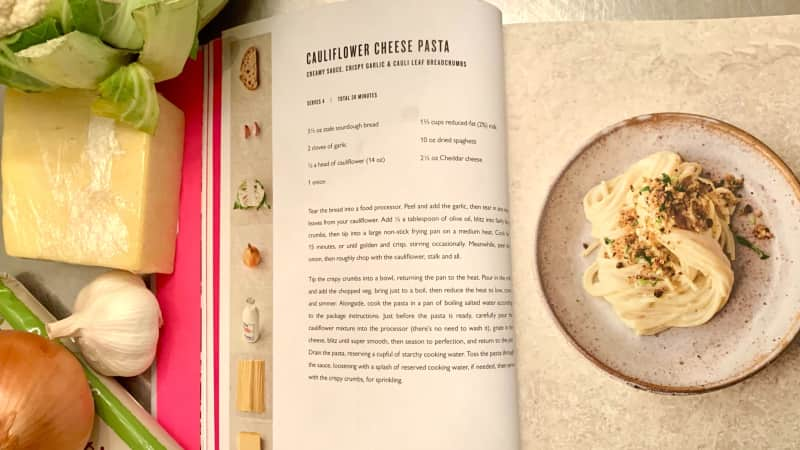
Ingredients are photographed individually in each recipe in Jamie Oliver’s “7 Ways.”
On that cauliflower, that is one of the 18 hero ingredients. It’s a delight to see Oliver present the hero ingredient as a risotto with parmesan cheese and prosciutto, among others.
Though data practicality drove the vision behind “7 Ways,” its clear instructions from Oliver on best practices for fish buying, ingredient selection and ratio of vegetables/dairy/fish allows me to write “it’s also healthy” at the end of this review. — Margaret Dawson
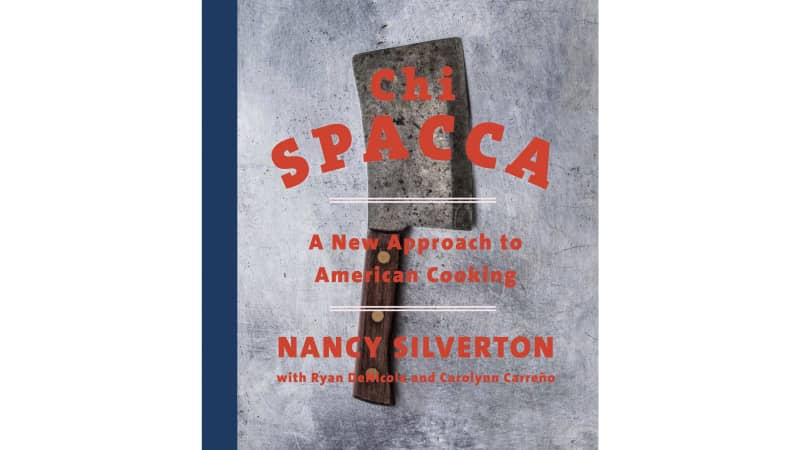
‘Chi Spacca’ brings the one-of-a-kind flavors of Los Angeles’s famed Italian steakhouse to your home.
Courtesy Alfred A. Knopf
This hallowed restaurant is a temple of meat in Los Angeles. It’s helmed by Nancy Silverton, who has had the run of the “Mozza corner” of Highland and Melrose since opening Pizzeria Mozza in 2006.
For her latest cookbook, Silverton pulls back the curtain of the kitchen at Chi Spacca.
Written with Ryan DeNicola, Chi Spacca’s executive chef, and Carolynn Carreño, the cookbook really gets going with DeNicola’s deep-dive chapter, “Grilling Class.” For anyone who’s been wary of cooking meat on the grill, or cooking, this is essential reading.
Lest you think this cookbook is only about charred flesh, it isn’t.
The recipe for the restaurant’s most requested menu item, focaccia di Recco, is a game-changer, especially if you’re tired with futzing with a sourdough starter and want to step it up to dough stretching. Silverton writes, “… you may have no idea what focaccia di Recco is. Also called focaccia col formaggio (focaccia with cheese), this is nothing like any other focaccia you’ve ever tasted.” Truth.
I also learned to make aoli by hand, which goes with basically everything and is now a staple of my diet as the bacon, lettuce, tomato and avocado salad with which it’s served.
The main event in this cookbook is the carne, recipes for the aformentioned bisteca, along with lamb, veal as well fish and vegetable sides (contorini), which in many households make for a fantastic dinner on their own: recipes for whole roasted cauliflower, sweet potatoes, eggplant are all standout and standalone meals.
But then there are the squash blossoms — by far my favorite contorini. Roasted and stuffed with ricotta, it will make you cry it’s so good. — Brekke Fletcher
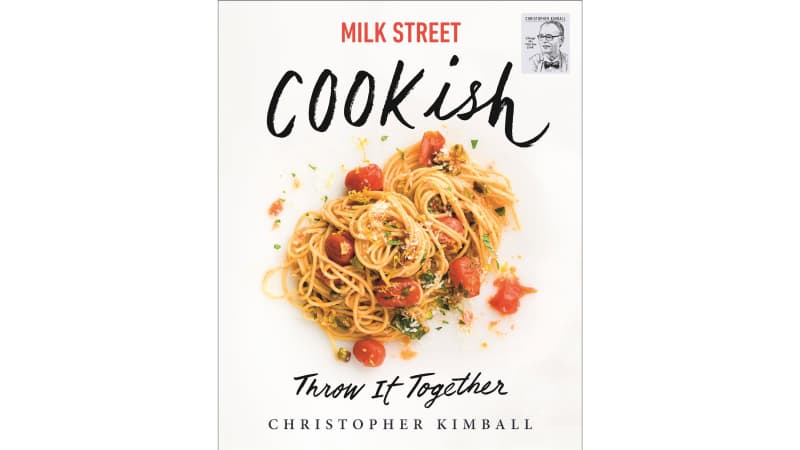
“Milk Street: Cookish: Throw It Together” somehow read my working-mom mind in a cookbook that asks you to invest in a power pantry then delivers recipes that boast ease, flavor, and variety
Connie Miller/Voracious Books
“Historically, I’ve had little love for cookbooks that promise meals in minutes or sport titles along the lines of 5-Ingredient Cookbook!”

Charred corn with coconut chilies and lime from “Milk Street: Cookish: Throw it Together” were added to our family’s weekly taco night.
Margaret Dawson/CNN
Kimball says when he founded the Milk Street empire from which this latest cookbook was born, he seized onto a more global view of cooking — that it’s the ingredients that matter most.
Here he makes a compelling case for what he deems is a “powerhouse supermarket pantry” — miso, garam masala, harissa and ground turmeric to name a few — and delivers on the promise the investment brings.
This is a recipe collection bursting with ease, allowing a handful of key ingredients to orient a dish. Into weekly taco night, I tried his charred corn with coconut chilies and lime, the simplicity of which checked every box: speed, practicality, ease, flavor.
We had his maple and soy-glazed chicken skewers, paired with his roasted carrots with turmeric-honey. Kimball peppers the book with four options for the food item to rotate into weekly menus as you wish: recipes that present Brussels sprouts or green beans or whole cauliflower four ways — and that’s just the section on vegetables.
There were so many Post-It notes marking the “Cookish” recipes I wanted to try it felt like what started out as a bad first date blossomed into a successful relationship. — Margaret Dawson

Asha Gomez’s second cookbook focuses on colorful ingredients and the power of family.
Evan Sung/Running Press
Kerala-born, Atlanta-based chef and author Asha Gomez has reunited with her co-author, Martha Hall Foose, for a new culinary tome, “I Cook in Color.” Their 2016 cookbook, “My Two Souths: Blending the Flavors of India into a Southern Kitchen,” was nominated for a James Beard Award.
Gomez, who was born in Southern India and has been in the United States for most of her life, has made her career fusing the flavors of her South India birthplace with those of her US Southern home.
Gomez’s latest work puts an emphasis on spices — but most importantly being a curious and adventurous eater with a mind towards nutrition and healthy dishes. The recipes all cohere around Gomez’s life, her stories, her travels, her family and friends.
For example, her love of the Caribbean and the flavors of St. Croix, Jamaica, Antigua inspired recipes for Caribbean Fried Snapper and Crucian Curry Chicken.
Her years working in New York City and eating spicy shrimp marinara over linguine at a restaurant on Mulberry Street in Little Italy inspired her Spicy Garlic Shrimp with Capers.
A Queens, New York, noodle take-out spot was a go-to for Gomez over 15 years ago, and now her iteration of Singapore noodles.
Her teenage son, Ethan, clearly inspires Gomez as much as any of her past exploits and travels do, and her dedication and love for him drips from nearly every page.
“I Cook in Color” is a testimonial of love, through food and friends, passed on from generation to generation, from continent to continent. — Brekke Fletcher

“In Bibi’s Kitchen” is a bright and beautiful homage to the recipes and stories from eight African countries: Eritrea, Somalia, Kenya, Tanazania, Mozambique, South Africa, Madagascar and Comoros.
Penguin Randomhouse
More than a book of recipes, “In Bibi’s Kitchen” is a bright and beautiful homage to the recipes and stories from eight African countries: Eritrea, Somalia, Kenya, Tanzania, Mozambique, South Africa, Madagascar and Comoros. In each section, bibis (grandmothers in Swahili) from the Indian-Ocean bordering countries share thoughts on cooking, food traditions and more.

Xawaash, a Yemeni spice blend, is an ingredient in the Somali dish Beef Suqaar, and it’s worth making for the heady scent of cinnamon, cumin, coriander, cloves and cardamom that fills the kitchen.
Stacey Lastoe/CNN
Most of the recipes in the thoughtfully laid out book are approachable, their list of ingredients are ones found in most home cooks’ pantries. Some, like Ma Halima’s Beef Suqaar, a rich beef and tomato-based dish referred to as Somali stir-fry, require a bit of legwork.
The key ingredient is xawaash, a Yemeni spice blend, and it’s worth making for heady scent of cinnamon, cumin, coriander, cloves and cardamom that fills the kitchen.
Written by Hawa Hassan and Julia Turshen, friends with a belief that “grandmothers hold the world’s most important stories,” this collection of stories and recipes is rich and rooted and bound to become a kitchen staple. — Stacey Lastoe

IFor the novice or even the above-average home cook, the recipes contained in “Kiin” may be more than a bit daunting, but they are more than rewarding.
Penguin Canada
Chef and restaurateur Nuit Regular, who grew up in Thailand, calls northern Thai cooking a journey. Indeed, for the novice or even the above-average home cook, the recipes contained in Kiin may be more than a bit daunting. Most recipes call for 10 or more ingredients and include arguably arduous steps.
For the more ambitious or veteran cooks seeking a challenge, however, “Kiin” may be just the right speed.
The rewards — not to mention the flavor payoff — of a dish such as Stir-Fried Flat Rice Noodles with Gravy (Lad Nha) are not insignificant. Regular’s dishes exemplify the best of Thai food — that sour, sweet, salty and spicy combination we take for granted when ordering from our local Thai restaurant.
Several of the book’s recipes do offer a store-bought option for an ingredient here or there, and there are often a few optional ingredients in the arms-long lists. too. In spite of these helpful shortcuts, “Kiin” tends toward more complicated than not. And to follow a recipe to a tee, you may find yourself chasing down items such as pandan leaves or magrud lime leaves. Still, there’s a lot to love about this big, beautiful book, and a rainy day waiting for its big moment. — Stacey Lastoe

Ina Garten’s “Modern Comfort Food” elevates classic comfort food dishes, including specific ingredients or brands easy-to-find at your local grocery store
Quentin Bacon/Clarkson Potter
The cookbook features endearing practicalities throughout. She channels us all who despair at recipes that call for hard-to-find ingredients by providing helpful recommendations on specific brands.
To wit: “2 cups beef broth, such as College Inn, ¾ cup fine cornmeal, such as Indian Head, Citterio makes a 4-ounce package of perfectly diced, 4 sandwich potato rolls, such as Martin’s.” She includes details like these on nearly every page, items easy to find in an average American grocery store.
Seasoned home cooks also know that we can’t be Contessa in the kitchen every night so meal shortcuts are crucial. Arriving at the puff pastry croutons recipe, she recommends to serve with her chicken pot pie soup, I stopped. Did she really include a recipe that’s practically the directions on the box?
Her chocolate chip ice cream sandwiches are, essentially: buy a box of chocolate chip cookies (“crisp…such as Tate’s”), scoop ice cream between two of them and roll some chopped toffee on the outer edges. Oh my God, I love her.
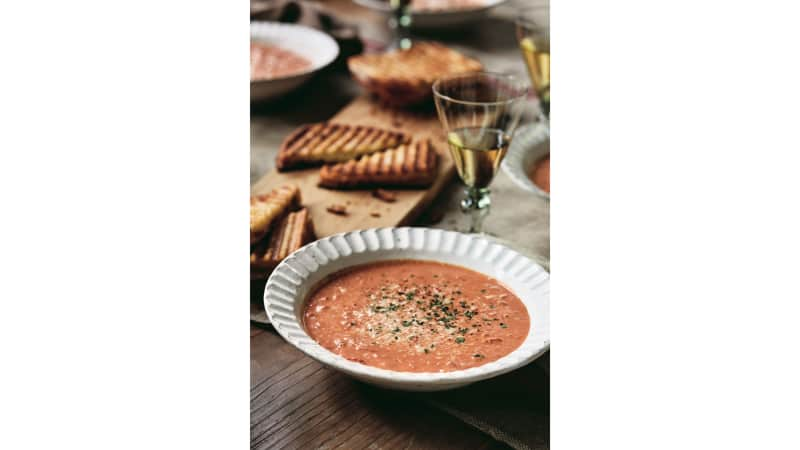
Ina Garten’s creamy tomato bisque transformed me into a (lower case) barefoot contessa.
Quentin Bacon/Clarkson Potter
Appealing shortcuts aside, the stars of “Modern Comfort Food” are her kitchen-tested, comfort food upgrades: a creamy tomato bisque earned a rare word of approval from my child’s nanny. An upscale tuna melt helped me overcome my reproach of sandwiches.
Given the timing of “Modern Comfort Food,” the cookbook itself is a keeper. — Margaret Dawson
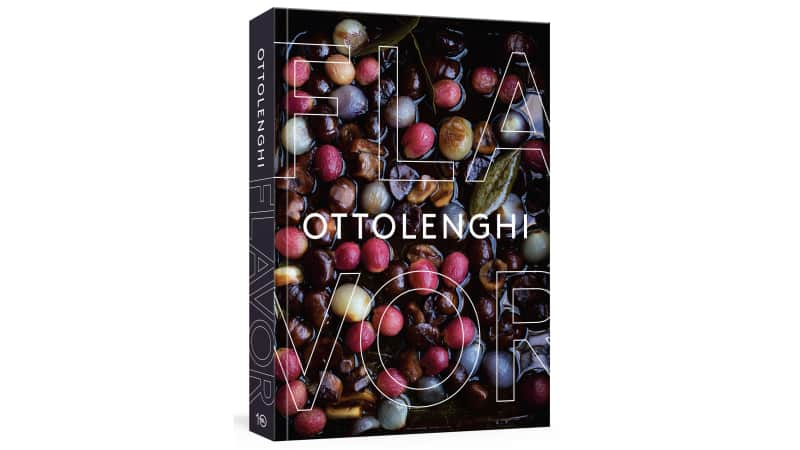
“Ottolenghi Flavor” is broken up into unique-sounding sections — process, pairing, produce — each with the intention of maximizing flavor using certain cooking methods and pairing techniques
Ten Speed Press
There are curry fries, and then there are Yotam Ottolenghi curry fries. The Israeli-English chef, restaurateur and food writer is back with another flavor-boasting cookbook, along with cook and recipe tester Ixta Belfrage.
The gorgeous cookbook is broken up into unique-sounding sections — process, pairing, produce — each with the intention of maximizing flavor using certain cooking methods and pairing techniques.
While Ottolenghi isn’t necessarily trying to convince the reader to go vegetarian tomorrow, he is rather hellbent on demonstrating the myriad ways vegetables can be utilized to ultimately deliver dishes as delicious as the richest meat-based ones.
The aforementioned curry fries are not, of course, meant to be served as a meal but as a side that goes above and beyond ordinary flavor profiles.
The work involved in this dish isn’t insignificant: The oil for the homemade mayonnaise must be infused and curry leaves procured. There’s straining and waiting and fry-turning. But the result — salty lime russets, perfectly crisped dipped in a from-scratch mayo oozing with umami, bite and creamy fat — may just ruin you for all other (oven) fries.
At the very least, this book will get you to not only eat your vegetables but to look for every opportunity to do so. — Stacey Lastoe

Octopus Publishing Group
Sabrina Ghayour offers an array of flavors so unfamiliar to my taste buds that some seemed a tad strange at first. I’d never combined 3 inches of raw, fresh ginger with tomatoes and tamarind until I tried making her tomato and peanut salad. The flavor combinations are unfamiliar, and that’s what makes them intriguing.
In “Simply: Easy Everyday Dishes,” you’ll find sticky harissa and sesame chicken along with orange, turmeric and coconut rice pudding. I quickly learned that a little spice-tempering fit my taste buds best, and when I cut down the ginger in that tamarind and tomato salad, it was devoured by my friends at my last barbecue.
I had to send everyone the recipe. I realized the delights of turmeric in sweet dishes and am now making tamarind a part of my regular repertoire. Tamarind chutney was all I could find but still worked in the recipes. The book suggests an open mind and the delicious photos offer encouragement. — Channon Hodge
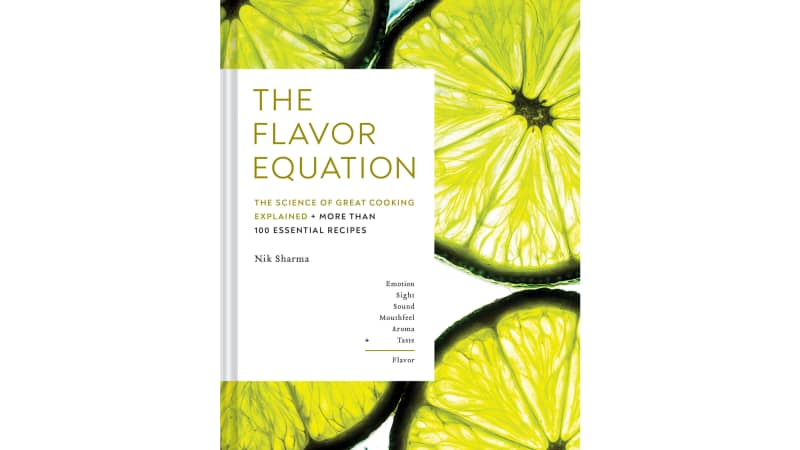
By Sharma’s equation, emotion + sight + sound + mouthfeel + aroma + taste = flavor. And that’s what this cookbook is all about.
Nik Sharma
In Sharma’s second cookbook, the food writer and recipe developer suggests that emotions play a big role in flavor. By Sharma’s equation, emotion + sight + sound + mouthfeel + aroma + taste = flavor.
Science is an inherent part of the cooking process and while the early part of the book takes a fairly intricate look at its role in the kitchen, it lends understanding and background you’ll appreciate once you roll up your sleeves and get cooking.
Take the Spareribs in Malt Vinegar + Mashed Potatoes recipe, filed under the chapter called Brightness. The ribs are cooked with a decent amount of vinegar and white wine, both acidic ingredients, but they’re also bathed in sweet and spicy liquid, thanks to brown sugar, fennel and peppercorns. The result is fall-off-the-bone tender meat, its richness balanced by the bright acid and further smoothed out with the mashed potatoes.
There’s a lot to absorb here (pun intended), but Sharma is a very fine teacher. — Stacey Lastoe
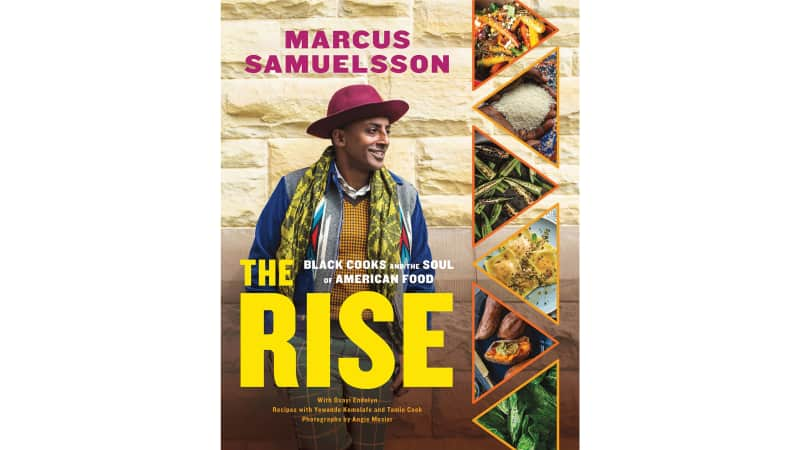
The cookbook is an encyclopedia of Black cooking and includes recommendations for restaurants, resources and other cookbooks to dive into.
Voracious Books
“Black is not a taste. Or is it?”
This is how chef Marcus Samuelsson begins his book, “Rise: Black Cooks and the Soul of American Food” written with Yewande Komolafe and Tamie Cook. The book challenges the notion that Black cooking has one monochromatic definition and puts the chefs who create it on their proper pedestal. The authors argue that there is no American food without Black food and offer over 150 recipes to prove their point.
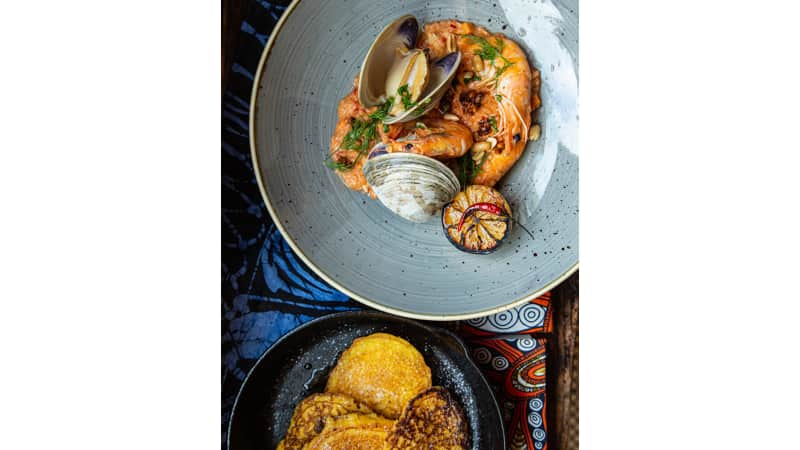
You’ll find seafood dishes in “The Rise.”
Angie Mosier/Voracious Books
The dishes were crafted as dedications to Black chefs, activists and famous personalities and their bios are throughout the book.
There’s chicken liver mousse dedicated to Eric Gestel, the lesser known ‘Black Eric’ of Le Bernardin. Citrus cured shrimp is for Mariya Russell, the first Black woman to helm a restaurant that won a Michelin star. I tried out the coconut-flavored rice and peas recipe created for Tavel Bristol-Joseph, a star pastry Guyanese chef in Texas.
It’s shameful I’ve never tried cooking something as simple and filling as rice and peas (learning also that peas’ actually means red beans in this traditional dish.) Sad, too, that I’d never heard of most of these chefs, but “The Rise” offers help for the ignorant like me with easy-to-follow recipes combined. — Channon Hodge

Vegetables are the star in “Vegetable Kingdom: The Abundant World of Vegan Recipes”
I used to write “no vegans” on all my dating profiles.
Terry’s recipes are complex. You’ll want to read them far enough ahead to soak cashews overnight or marinate tofu in jerk sauce. I had to google a picture of a sunchoke to find it later at the grocery store. Stick with Terry’s advice, however, and you will find yourself in all-new food territory.
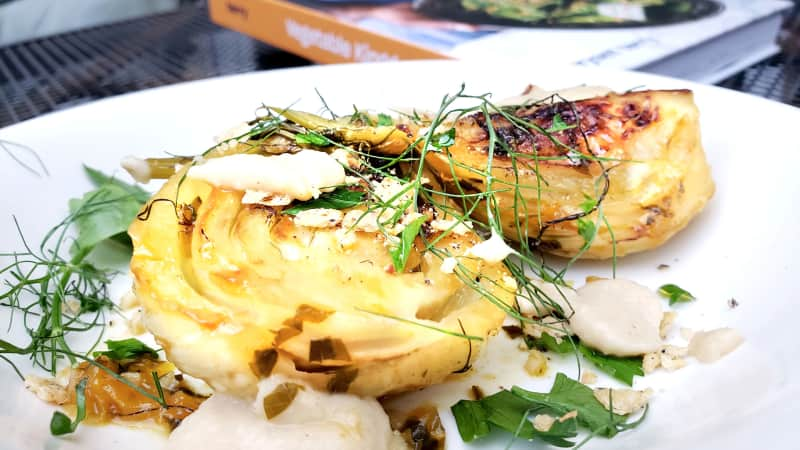
Lime, orange juice and garlic brings acidic joy to this fennel recipe from “Vegetable Kingdom”
Channon Hodge/CNN
I now have an easy plantain, pecan and millet salad that will be my go-to cookout contribution. Parsley went from boring to brilliant, and I’ve now memorized Terry’s fresh sweet parsley vinaigrette recipe. When I made his citrus and garlic-herb braised fennel, I realized the sharp, acidic joy that comes from combining lime and orange juice with garlic. Each recipe is a flavor festival, and the party is worth the prep. — Channon Hodge

The Xi’an Famous Foods restaurant chain started with a location in a basement food mall in Queens.
Jenny Huang
I gave a big ‘heck, yes!’ when my friend Bree suggested we start a pandemic cookbook exchange. Any of my 29 cookbooks will be up for grabs except “Xi’an Famous Foods,” which will have to be pried from my cold, dead hands.
This book, written by Xi’an CEO Jason Wang, offers basic cooking skills for noodle-freaks like me who are adept at ordering Western Chinese food but completely inept at cooking it. I’m a devoted customer at the Xi’an noodle shops but never imagined those chewy spiced dishes were easy to make at home.
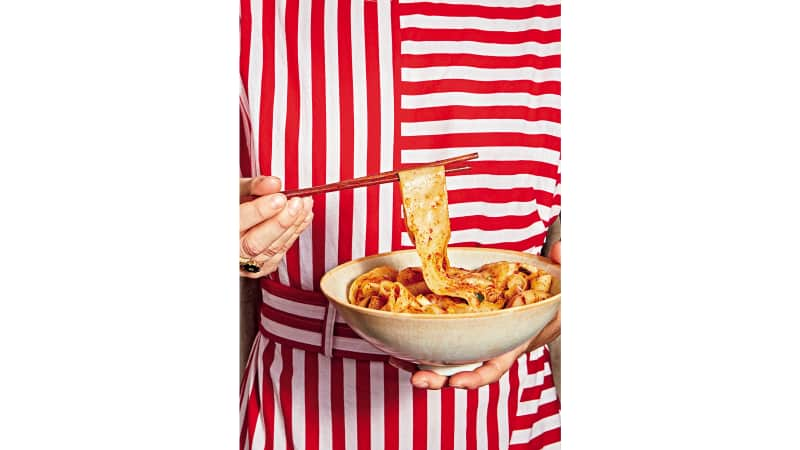
Get your noodle fix with “Xi’an Famous Foods.”
Jenny Huang
Their famous noodles and dumplings are made with all-purpose regular flour, salt and water — that’s it! Granted, I couldn’t quite “pull” them despite Wang’s patient and meticulous directions. So I ended up simply rolling and slicing them with a knife before boiling and adding to a pan of savory cumin lamb. I can’t wait to keep practicing (and slurping.) — Channon Hodge
